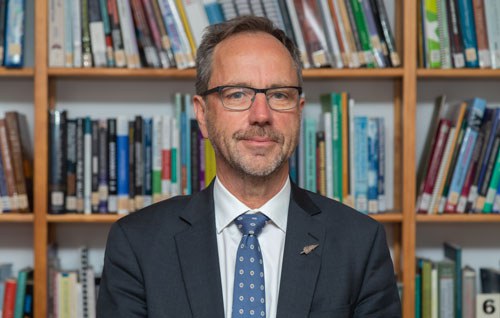Six questions with John Ryan, Controller and Auditor-General

John grew up in Petone, where his grandfather and father were both milkmen since the mid-1920s (“we come from a long service delivery family”). However, John’s father didn’t encourage him to follow in his footsteps and instead told John to “get into computers”.
John is a member of Chartered Accountants Australia and New Zealand, and has had a long and successful career in both the private and public sectors. His experience includes corporate, regulatory and operational management, and assurance. He’s also been a board member for some of our leading arts organisations, including the Royal New Zealand Ballet and the New Zealand Festival.
Before joining the Office John was Deputy Director-General of Corporate Services at the Ministry for Primary Industries. He began his seven-year term as the 20th Controller and Auditor-General on 2 July.
What was your first job in the public sector?
I was employed as a student in the holidays working for the Lower Hutt City Council at the Taita Cemetery. I thought it was pretty cool to work at a cemetery. I cleaned the graves, I weeded, I sunbathed when supervision was less than adequate. What else did I do? I learnt to drive a tractor to mow the lawns. My next job in the public sector was probably in the early-90s at Solid Energy, which was then Coal Corporation. I think I was called Chief Accountant, or something like that. I’d been out in the private sector for about 12 years at PricewaterhouseCoopers in Australia, the UK, and here, and at BOC Gases. At that time I was interested in energy companies and so moving to Solid Energy was a good transition into the energy sector and the broader public sector.
How do you think the public sector has changed the most since then?
I think the public sector has changed almost completely since when I was first in Council employment, and for the better. The change I feel most is around the focus on being “citizen-centric” in our services, which is bad jargon for making the system fit to people, not people fit the system. Although I think we will all acknowledge that this is still work in progress in some areas.
What’s been the highlight of your first eight weeks as Auditor-General?
I had some very positive impressions of the Office’s integrity and independence before I came, and the highlight has been how strong and present these values are for everybody I’ve met. Finding an organisation with a strong and resolute values base coupled with a high level of ambition for performance and accountability in the public sector have been some of the many highlights so far.
What’s been the most surprising thing about joining the Office?
The most surprising thing about joining the Office is the size of my office! It’s actually suitable for probably ten people.
What do you want to achieve during your term as Auditor-General?
The Office needs to be recognised as champions for public sector performance and accountability for the 21st century. That means we need to be relevant, strongly connected, active, and be seen as leaders while retaining our core values of integrity and independence. To be successful, we have to help reimagine the current public accountability system for the different world that’s emerging, and from what I’ve seen so far the Office is well placed to take on these challenges.
What do you think is the greatest challenge facing the public sector?
Remaining vigilant. We do have a world-class public management system that helps make New Zealand a great place to live. Protecting and developing that as the world changes will be one of our biggest challenges. And the other thing I think is making sure that we don’t disconnect from the public, and that includes all of the organisations that make up the public sector, from schools to hospitals, to universities and polytechs, to your local council, and to government departments. The organisations (and sectors) that we all rely on as citizens need to be truly accountable for their performance to the public they serve.
